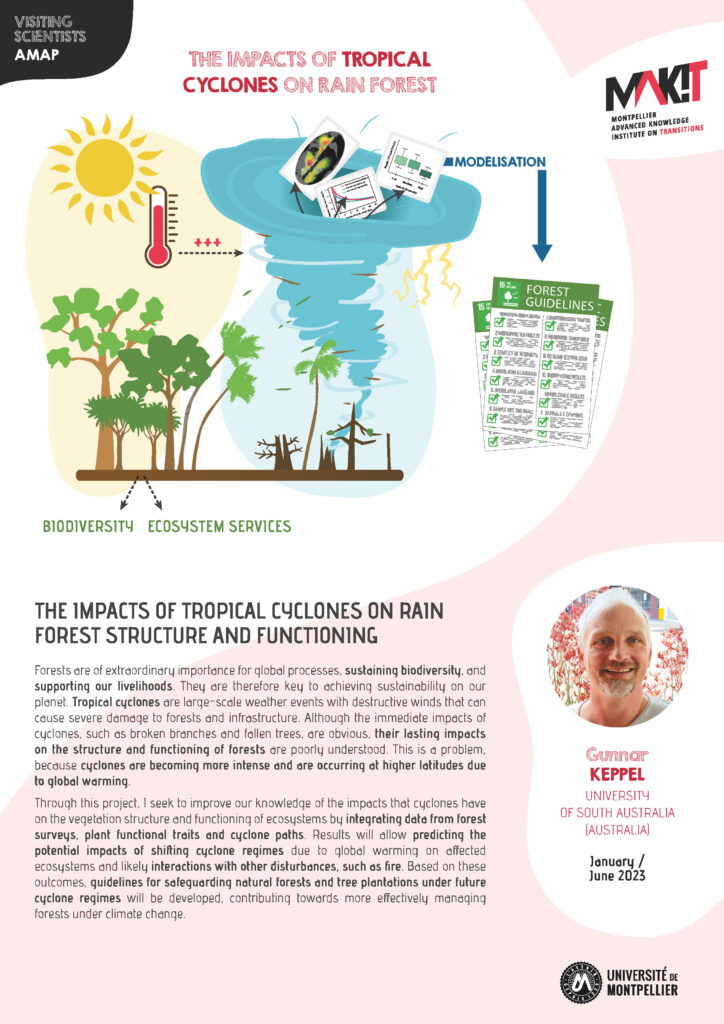Gunnar Keppel
Gunnar Keppel is an environmental biologist at the University of South Australia, with a broad background in vegetation ecology, island biogeography and conservation biology. The ecology and conservation of forest and island ecosystems in Oceania are the key focus of his research.
Dr Keppel’s undergraduate and Master’s degrees were undertaken at the University of the South Pacific in Fiji and his PhD at the University of Queensland. He has published nearly 100 peer-reviewed articles. Many of these are in leading journals and his research on the role of refugia in sustaining biodiversity under climate change, the biogeography of Pacific Islands, and the global distribution of tree species is widely cited. In addition, his research and mentoring have made important contributions towards conservation and capacity building in the Pacific region.
Education is also important for Dr Keppel who is passionate about developing the next generation of scientists through teaching courses and supervising research students.
Forests are of extraordinary importance for global processes, sustaining biodiversity, and supporting our livelihoods. They are therefore key to achieving sustainability on our planet. Tropical cyclones are large-scale weather events with destructive winds that can cause severe damage to forests and infrastructure. Although the immediate impacts of cyclones, such as broken branches and fallen trees, are obvious, their lasting impacts on the structure and functioning of forests are poorly understood. This is a problem, because cyclones are becoming more intense and are occurring at higher latitudes due to global warming. In collaboration with the AMAP joint research unit in Montpellier, I seek to improve our knowledge of the impacts that cyclones have on the vegetation structure and functioning of ecosystems by integrating data from forest surveys, plant functional traits and cyclone paths. Results will allow predicting the potential impacts of shifting cyclone regimes due to global warming on affected ecosystems and likely interactions with other disturbances, such as fire. Based on these outcomes, guidelines for safeguarding natural forests and tree plantations under future cyclone regimes will be developed, contributing towards more effectively managing forests under climate change.

Cyclones are becoming stronger and bigger because of global warming. This will impact trees in natural and anthropogenic systems. The webinar brought together experts from a wide range of fields to introduce cyclone impacts on trees in agroforestry, forestry and natural forests. Discussions focused on the likely impacts of more intense cyclones and how to manage them.
Invited speakers:
Gunnar Keppel, University of South Australia, Australia & MAK’IT 2022-2023 Fellow, France.
Swen Jullien, JRU ‘Physical and Spatial Oceanography Laboratory’ (ODE-LOPS-SIAM), IFREMER, France.
Thierry Fourcaud, JRU ‘Plant Architecture, Functioning and Evolution’ (AMAP), CIRAD, France.
Kana Kamimura, Department of Agricultural and Life Sciences, Shinshu University, Japan.
Thomas Ibanez, JRU ‘Plant Architecture, Functioning and Evolution’ (AMAP), IRD, France.
Eduardo Somarriba, Tropical Agricultural Center for Research and Higher Education (CATIE), Costa Rica & MAK’IT 2022-2023 Fellow.
Edward Webb, University of Helsinki, Finland.